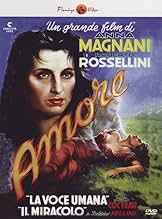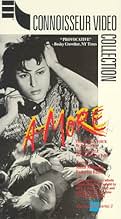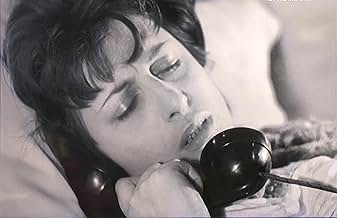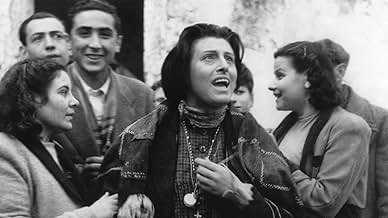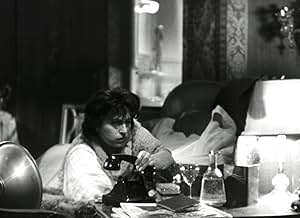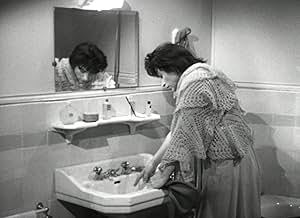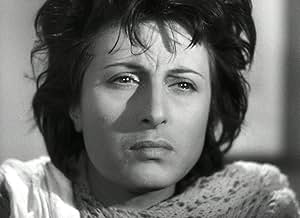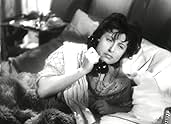AVALIAÇÃO DA IMDb
6,9/10
2,1 mil
SUA AVALIAÇÃO
Adicionar um enredo no seu idiomaIn part one, a heartbroken woman talks to her ex-lover on the phone. In part two, a pregnant woman believes she is carrying the child of Saint Joseph.In part one, a heartbroken woman talks to her ex-lover on the phone. In part two, a pregnant woman believes she is carrying the child of Saint Joseph.In part one, a heartbroken woman talks to her ex-lover on the phone. In part two, a pregnant woman believes she is carrying the child of Saint Joseph.
- Direção
- Roteiristas
- Artistas
- Prêmios
- 2 vitórias e 2 indicações no total
Avaliações em destaque
It could be something of a challenge to be fair to L'Amore as a whole if one of its two shorts, one titled 'The Human Voice' (script by Jean Cocteau) and the other titled 'The Miracle' (original script by Federico Fellini), sold short of the other. But in the end, one only slightly edges out over the other, and not by much, which is really saying something in this case. Italian neo-realist icon Roberto Rossellini changed gears, to a point, after bringing forth his 'post-war' trilogy of films (Roma Citta Aperta, Paisa, Germany Year Zero) that would catapult him into worldwide recognition. This is essentially a small film, in a way smaller and even more (considering his previous trio, amazingly) simplistic in storytelling terms and scope. Instead of war's anguish coming on as the main dread of the existences of the characters, here there are only two key characters for the two stories respectively, and played by the same actress no less.
This could be a gamble for Rossellini, putting so much faith in an actress to pull off two quite different roles (well, maybe not TOO different, there are some underlying qualities to both). Anna Magnani, however, was worth the gamble for him. This is proved right off the bat with 'Voice', where Magnani, for 75 percent of the film's running time, is in either medium-close up or close-up by Rossellini's elegant, probing (without seemingly to try) lens, as Magnani's character has a long, painful, and ultimately confessional conversation with her love who has left her. This is off the bat something that most can identify with; we know what it's like sometimes to be in a room and over-hear an outpouring of emotions through the walls (or sometimes ourselves talking in these conversations), practically wanting not to listen at all. But Cocteau understands that a conversation like this can be made into a kind of extraordinary poetry of sorts, by stripping away at the seams of the human soul (err, voice in this case), and aided by the right person to pull it off. Magnani, therefore, works because she conveys so much in her expressions, her eyes and of course voice, all without having to go into soap opera hysterics. Even towards the end of the film, where some of the momentum is lost, Magnani is like some force that you can't look away from.
This notion that Anna Magnani is in this overall project almost like her own vehicle, as Scorsese has said in his film My Voyage to Italy (which inspired me to seek this out to start with), it's un-thinkable to see anyone else play either of the two roles. This is especially so in 'The Miracle', different from anything else Rossellini had done up till that time (I could be wrong, I haven't seen anything he made pre Roma Citta Aperta) in that it takes place in a time unknown. It could be present day, or hundreds of years ago. It's a fable, with its story origins in a budding cartoonist, Fellini, who also appears here in his one and only acting role as a kind of Vagabond (and quite a suave looking one, ho-ho). Magnani plays the peasant woman, perhaps not altogether in her head, and believes as he passes by she has seen St. Joseph. She stops him, she praises and rambles, he offers her wine, and she passes out. Cut to another time in the future, and she discovers she's pregnant. Never had sex? Hmm...
The Miracle, a film that got in a heap of controversy, and in the process changed a vital point of how films were allowed to be shown in American cinemas from the 50's onward (a little historical fact few know of today), is to me perhaps one of the most powerful 'fables' I've ever seen, at least from people like Rossellini and Fellini (the later made a great career out of fashioning them out of almost nothing). It is also a very telling story about religion and faith, and to my way of thinking still holds a relevance just as meaningful today as back in the later 40's and early 50's. The peasant woman turned homeless that Magnani plays so beautifully (for such a simple character there is enough nuance for two performances) holds onto faith because, frankly, it's all that she has. She gets berated by all the townsfolk- particularly the religious folk for having a child out of wedlock and under such strange circumstances- yet nothing gets in the way of her own determination of what she thinks is true.
Even if you don't have a belief in Catholicism or even just religion, the film has an impact because of elemental questions Rossellini is trying to raise. I can't say what they are here, as they will bring different answers for the individual viewer. But the fact that Fellini and Rossellini are stirring up such thoughts among such touching and near-perfect acting and stylizing (there's even a slight touch of humor in the early scenes with Fellini) and not forcing them on the viewer, not to sound catchy about it, is a miracle in and of itself, and one of the director's best films taking into account the two as L'Amore... Be advised though- as of now this film is EXTREMELY hard to find, and only after many months and more money than I'd care to say I discovered a copy on video, so only if you feel a strong urge to see the film (likely, as with myself, from having seen the clips from My Voyage to Italy) would I recommend it. But if you do, it could serve a very rewarding experience.
This could be a gamble for Rossellini, putting so much faith in an actress to pull off two quite different roles (well, maybe not TOO different, there are some underlying qualities to both). Anna Magnani, however, was worth the gamble for him. This is proved right off the bat with 'Voice', where Magnani, for 75 percent of the film's running time, is in either medium-close up or close-up by Rossellini's elegant, probing (without seemingly to try) lens, as Magnani's character has a long, painful, and ultimately confessional conversation with her love who has left her. This is off the bat something that most can identify with; we know what it's like sometimes to be in a room and over-hear an outpouring of emotions through the walls (or sometimes ourselves talking in these conversations), practically wanting not to listen at all. But Cocteau understands that a conversation like this can be made into a kind of extraordinary poetry of sorts, by stripping away at the seams of the human soul (err, voice in this case), and aided by the right person to pull it off. Magnani, therefore, works because she conveys so much in her expressions, her eyes and of course voice, all without having to go into soap opera hysterics. Even towards the end of the film, where some of the momentum is lost, Magnani is like some force that you can't look away from.
This notion that Anna Magnani is in this overall project almost like her own vehicle, as Scorsese has said in his film My Voyage to Italy (which inspired me to seek this out to start with), it's un-thinkable to see anyone else play either of the two roles. This is especially so in 'The Miracle', different from anything else Rossellini had done up till that time (I could be wrong, I haven't seen anything he made pre Roma Citta Aperta) in that it takes place in a time unknown. It could be present day, or hundreds of years ago. It's a fable, with its story origins in a budding cartoonist, Fellini, who also appears here in his one and only acting role as a kind of Vagabond (and quite a suave looking one, ho-ho). Magnani plays the peasant woman, perhaps not altogether in her head, and believes as he passes by she has seen St. Joseph. She stops him, she praises and rambles, he offers her wine, and she passes out. Cut to another time in the future, and she discovers she's pregnant. Never had sex? Hmm...
The Miracle, a film that got in a heap of controversy, and in the process changed a vital point of how films were allowed to be shown in American cinemas from the 50's onward (a little historical fact few know of today), is to me perhaps one of the most powerful 'fables' I've ever seen, at least from people like Rossellini and Fellini (the later made a great career out of fashioning them out of almost nothing). It is also a very telling story about religion and faith, and to my way of thinking still holds a relevance just as meaningful today as back in the later 40's and early 50's. The peasant woman turned homeless that Magnani plays so beautifully (for such a simple character there is enough nuance for two performances) holds onto faith because, frankly, it's all that she has. She gets berated by all the townsfolk- particularly the religious folk for having a child out of wedlock and under such strange circumstances- yet nothing gets in the way of her own determination of what she thinks is true.
Even if you don't have a belief in Catholicism or even just religion, the film has an impact because of elemental questions Rossellini is trying to raise. I can't say what they are here, as they will bring different answers for the individual viewer. But the fact that Fellini and Rossellini are stirring up such thoughts among such touching and near-perfect acting and stylizing (there's even a slight touch of humor in the early scenes with Fellini) and not forcing them on the viewer, not to sound catchy about it, is a miracle in and of itself, and one of the director's best films taking into account the two as L'Amore... Be advised though- as of now this film is EXTREMELY hard to find, and only after many months and more money than I'd care to say I discovered a copy on video, so only if you feel a strong urge to see the film (likely, as with myself, from having seen the clips from My Voyage to Italy) would I recommend it. But if you do, it could serve a very rewarding experience.
It has been noted elsewhere that this film is a fine indicator of Italian filmmakers' rupture with Neorealism, and how (in the second segment) they often turned to satire and the grotesque, a liking they shared with Spanish colleagues. "Una voce umana", the first segment, based on Jean Cocteau's 1930 monologue, about a woman who resists to break up with a man on the telephone, is the weakest part, not because of the text, Rossellini's direction or Magnani's performance. For me the problem is that the lady in question is anything but in love. She is obssessed and crazed, and after a few minutes, her addiction turns tiresome. Magnani tries had, Rossellini moves her all around the apartment, but she awakens little compassion.
Then there is "Il miracolo", from an idea by Federico Fellini (no proof has been found that it was plagiarized from a text by Ramón María del Valle Inclán, a master of the grotesque), in which Nanni, a beggar, is seduced by a traveler, and the poor woman assumes her pregnancy as a divine design. The segment created a little scandal in the United States in the 1950s, as it happened years later with "The Last Temptation of Christ", but today no Catholic hypocrit would think of raising an inquisitive voice over Nanni's sad story.
It is a nice job for in Rossellini's evolution as an author and another demonstration of la Magnani's art, but other than that it's an overrated minor work.
Then there is "Il miracolo", from an idea by Federico Fellini (no proof has been found that it was plagiarized from a text by Ramón María del Valle Inclán, a master of the grotesque), in which Nanni, a beggar, is seduced by a traveler, and the poor woman assumes her pregnancy as a divine design. The segment created a little scandal in the United States in the 1950s, as it happened years later with "The Last Temptation of Christ", but today no Catholic hypocrit would think of raising an inquisitive voice over Nanni's sad story.
It is a nice job for in Rossellini's evolution as an author and another demonstration of la Magnani's art, but other than that it's an overrated minor work.
L'Amore is divided into two parts, the first called "A Human Voice", and the second named "The Miracle". Anna Magnani is wonderful at both. The first episode is about love and sadness. A woman is pursuing for a man who does not love her any longer. The whole episode occurs whitin a bedroom, with Anna and a telephone. The dialogue of Anna with her ex-husband is simply fantastic and very emotive. The second episode, more cryptic and stronger, shows us a medieval Italian town with all its beliefs and supersticions. A woman, Anna Magnani again, makes remember us the mistery of creation, with symbolic references to some christian icons (as virgins, poor people, saints, etc.). In sum, this is a wonderful film.
Two short stories about love: the first, based on a Jean Cocteau story, is a powerful sola tour-de-force by the great actress Anna Magnani; it's always hard to pull off an one-set, one-person monologue on the screen successfully, but she does it. The second, based on what can only euphemistically be called a "story" (mostly shots of Magnani walking) by Frederico Fellini, is rambling nonsense; unfortunately, it is also longer than the first episode, and also has nothing really to do with the topic of the title - it does not belong here. *** out of 4 for the first episode, * for the second, ** on average.
Roberto Rossellini freely admitted that the two films that make up this opus were designed as a showcase for the talents of his then partner and muse Anna Magnani. Neither film could be said to have had an easy ride as 'Il Miracolo' was banned in America thanks to that self-appointed guardian of morality, the crackpot Catholic League of Decency whilst 'Voce Umana' was not widely shown because of copyright issues with Jean Cocteau's original play.
Ingmar Bergman once said that the greatest contribution to the art of film is the well lit, well directed and well acted close-up. This is certainly true of 'Voce Umana' in which a woman alone in her apartment is desperately trying to salvage a doomed relationship over the telephone and whose agony is intensified by the phone constantly cutting off. The almost microscopic close-ups here hold no fears for Signora Magnani who is utterly riveting. Although this is a shortened version of Cocteau's original it is no less effective and her intensely emotional performance is aided by Eraldo da Roma's dynamic editing and the use of light and dark by cinematographer Otello Martelli. None of us likes rejection of course but one does feel at times like shouting out 'pull yourself together woman, he's obviously not worth it'.
Most directors never find a muse whereas Rossellini had the good fortune to have not one but two. 'Voce umana' is even more poignant, in retrospect, as he left Magnani two years later for muse#2 Ingrid Bergman. Ironically Miss Bergman was to give a powerhouse performance in a longer version of this piece on American television in 1966.
'Il Miracolo' is quite frankly not as accomplished a film. As in so many of his neo-realist films Rossellini is again playing puppet master to a supporting cast mainly composed of 'real people', that is to say non-professionals who cannot act and who are obviously 'dubbed'. The jury is still out on Fellini's acting abilities! Its rawness and immediacy still pack a punch thanks to Anna Magnani's stupendous portrayal of simpleton Nannina, the camerawork of Aldo Tonti and to another powerful score from Rossellini's brother Renzo.
The true 'miracle' of this piece is that the eventual lifting of its ban, based upon the principle of free expression, marked the beginning of the end for film censorship.
Regarding the wondrous Magnani let us leave the last word to William Dieterle who directed her in 'Volcano' at the same time as Rossellini was directing Bergman in 'Stromboli'. "She was the last of the great, shameless emotionalists."
Ingmar Bergman once said that the greatest contribution to the art of film is the well lit, well directed and well acted close-up. This is certainly true of 'Voce Umana' in which a woman alone in her apartment is desperately trying to salvage a doomed relationship over the telephone and whose agony is intensified by the phone constantly cutting off. The almost microscopic close-ups here hold no fears for Signora Magnani who is utterly riveting. Although this is a shortened version of Cocteau's original it is no less effective and her intensely emotional performance is aided by Eraldo da Roma's dynamic editing and the use of light and dark by cinematographer Otello Martelli. None of us likes rejection of course but one does feel at times like shouting out 'pull yourself together woman, he's obviously not worth it'.
Most directors never find a muse whereas Rossellini had the good fortune to have not one but two. 'Voce umana' is even more poignant, in retrospect, as he left Magnani two years later for muse#2 Ingrid Bergman. Ironically Miss Bergman was to give a powerhouse performance in a longer version of this piece on American television in 1966.
'Il Miracolo' is quite frankly not as accomplished a film. As in so many of his neo-realist films Rossellini is again playing puppet master to a supporting cast mainly composed of 'real people', that is to say non-professionals who cannot act and who are obviously 'dubbed'. The jury is still out on Fellini's acting abilities! Its rawness and immediacy still pack a punch thanks to Anna Magnani's stupendous portrayal of simpleton Nannina, the camerawork of Aldo Tonti and to another powerful score from Rossellini's brother Renzo.
The true 'miracle' of this piece is that the eventual lifting of its ban, based upon the principle of free expression, marked the beginning of the end for film censorship.
Regarding the wondrous Magnani let us leave the last word to William Dieterle who directed her in 'Volcano' at the same time as Rossellini was directing Bergman in 'Stromboli'. "She was the last of the great, shameless emotionalists."
Você sabia?
- CuriosidadesWhen, in 1952, the "Il Miracolo" segment of the film was released in the United States as "The Miracle", it was the subject of a legal battle in which the Supreme Court ruled for the first time that motion pictures, like books and newspapers, were protected under the First Amendment to the Constitution.
- Citações
La donna al telefono (segment "Una voce umana"): What? My black satin dress. Yes, I'm still wearing it. No, I didn't smoke. Just three cigarettes. I swear
- ConexõesEdited into Histoire(s) du cinéma: Une histoire seule (1989)
Principais escolhas
Faça login para avaliar e ver a lista de recomendações personalizadas
- How long is Love?Fornecido pela Alexa
Detalhes
- Tempo de duração1 hora 9 minutos
- Cor
- Proporção
- 1.37 : 1
Contribua para esta página
Sugerir uma alteração ou adicionar conteúdo ausente

